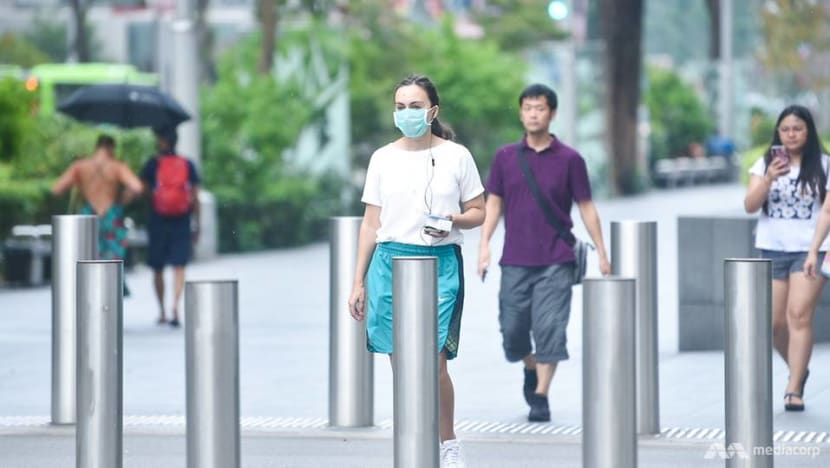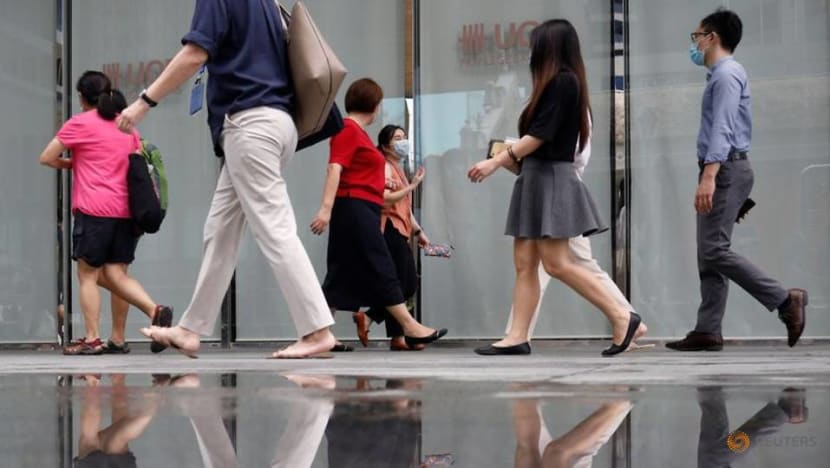commentary Commentary
Commentary: COVID-19 warped our sense of time. So let’s find new meaning in the small things
The repetitive nature of routines and actions, which COVID-19 disrupted, had given our lives meaning. And there are ways to reclaim a sense of agency, says Yale-NUS’ Nomi Claire Lazar.

A woman seen wearing a protective face mask at Orchard Road, Singapore on Mar 11, 2020. (Photo: Gaya Chandramohan)
SINGAPORE: COVID-19 has merged work and home, disrupted holidays and rituals, upended annual travel plans, and rendered futures uncertain.
New rhythms of days and weeks yield a deep uneasiness. It feels as though “time,” as William Shakespeare put it, “is out of joint”.
That’s probably because meaning in our lives comes not just from what we do but from when we do it.
Time’s rhythms – particularly sequence, simultaneity, and repetition – help create the stories that make life meaningful.
PURPOSE BEHIND OUR ACTIONS
Consider the repetitive sequences of a typical day. You get up, dress, maybe see kids off to school, ride the MRT, or have lunch at your favourite hawker centre. You repeat these actions day in and day out like a wheel spinning round.
But wheels spin round in order to move forward. And when a sequence leads up to a goal, discrete actions come together to form a cogent story.
READ: Commentary: Succeed in your career, settle down, buy a BTO. Is this Singaporean dream outdated?
We act so we can give our kids a good start in life. We work hard so we can finish a big project, get a promotion, address a social need, or earn enough to support our parents, and so on.
Goals give discrete actions meaning, and performing discrete actions help connect us to our goals. But when these established sequences get disrupted, our old series of actions can feel detached from their purpose.
It’s as though we’ve left the familiar path. We’re still moving, but we’re not sure where towards.

LOSING SENSE OF COMMUNITY
When rhythms are disrupted, we lose synch with others too. Acting at the same time creates community, even with people we don’t know.
Heading to the hawker centre in a lunch rush, amid strangers, we might grumble but feel a sense of togetherness.
READ: Commentary: Hawker food isn't what it used to be. And it’s partially our fault
Listening to the morning show on the radio while commuting pre-coronavirus, we knew many other Singaporeans are listening too. We shared an experience.
But stuck at home on most days these past few months without that communal glue, that sense of common experience, we feel adrift.
ROUTINES CREATE IDENTITY
What’s more, acting regularly, at a pre-determined time, helps create and express our identity. Regular actions are habits, and our habits help make us who we are.
When we break our habits, we may feel not quite ourselves. This explains why doing things at the “wrong” time – a daytime nap versus sleeping at night, a weekday matinee versus a cinema evening, or even pizza for breakfast – feels a little illicit, as if we are acting out of character.
Without those character-forming habits, with discrete actions disconnected from goals, with the community of strangers disrupted, no wonder we’ve felt unsettled.
Rhythms give actions their purpose, give us a sense of who we are and where we belong. Lost rhythms mean a lost sense of place in the world.
READ: Commentary: Worried about keeping your job? Here’s advice to soothe your concerns no matter how old you are
BEING INTENTIONAL ABOUT OUR TIME
On the bright side, it’s in the nature of crises to reveal normally hidden aspects of ourselves and our world.
While the pandemic itself offers nothing but net suffering, how we use new awareness may well lead to positive change that improves our lives.
There are so many ways to be intentional and aware of how time’s rhythms connect with life’s meaning.
READ: Commentary: Why living close to my siblings works for me
First, remain aware of how regularity forms habits which form identity, and re-examine your regular actions. For example, more working people have been able to share daily dinner with their families during COVID-19.
Beyond quality time itself, when dining together becomes a habit, a ritual, this becomes part of the family’s identity and a shared habit.
Dinner itself, not just the conversation that takes place there, becomes more meaningful when we ascribe the activity with value and start to identify with new patterns: “We are a family that sits down together at 6pm for dinner.”

FIND MEANING IN THE NEW THINGS WE DO
Second, when actions are disconnected from goals, we gain some distance. Since what we do regularly shapes who we are, we have a chance to reconsider or recommit to our broad goals and the means we use to get there.
For example, for some, that may mean realising Zoom meetings are more efficient, just as effective, and easier on health and relationships than global travel.
For others, turning to another form of work altogether may be more fulfilling.
READ: Commentary: When Singapore homes become workspaces – huge changes in the house and beyond
Third, when we do things together at the same time, whether that’s celebrating a religious event, daily lunch at a hawker centre, or celebrating National Day, our individual narratives, personal identities and goals, map onto grander narratives and identities, our cultures, our nations.
Recognising this, we can be more intentional about why these events, like birthdays, New Year’s Eve and other holidays matter, and appreciate them more.
SEIZE THE DAY
We feel most alive when our sequenced actions connect to a goal, when our sequences overlap with others’.
Through simultaneity, and when we act intentionally together to achieve collective goals, we create community and identity.
Then, actions as seemingly empty and repetitive as riding the MRT, or as grand as lending a helping hand to seniors advised to stay at home, can feel powerful and meaningful.
Crises are turning points in our personal stories, and in the grand stories of humanity. We get to choose what happens next.
While COVID-19 has upended the ways we spend our time, we can become more intentional about how we organise our time, not just how we use our time.
We can use these insights to create a sense of common purpose, build new things together, and enrich our lives going forward.
What's so special about Dover forest? The Nature Society (Singapore) and other guests make the case for factoring in the environment into urban planning in CNA's Heart of the Matter podcast:
BOOKMARK THIS: Our comprehensive coverage of the coronavirus outbreak and its developments
Download our app or subscribe to our Telegram channel for the latest updates on the coronavirus outbreak: https://cna.asia/telegram
Nomi Claire Lazar is Associate Professor of Social Sciences at Yale-NUS College and the author of Out of Joint: Power, Crisis, and the Rhetoric of Time (Yale Press, 2019).














